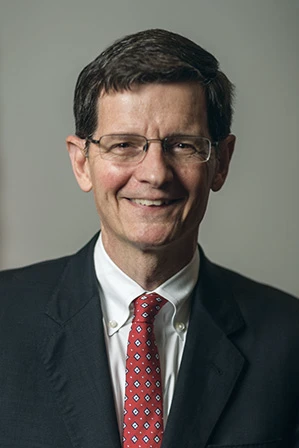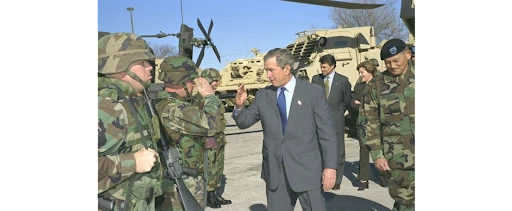When disaster strikes, foreign service officers are called upon to support the U.S. government’s response. This was the case in the years following the terrorist attacks of September 11, 2001—when soon after, President George W. Bush called for the deployment of troops into Afghanistan, marking the start of America’s war on terror, which would later also expand into Iraq in 2003.
Life in the Foreign Service was tense during this period as the Department of State struggled to find enough FSOs to fill these newly created war-zone positions—despite offering some additional incentives—largely due to the small size of the Foreign Service. John Naland recounts that at one point during a 2007 town hall meeting, Director General Harry Thomas and the secretary of state even began to consider the idea of filling these positions through the use of directed [involuntary] assignments. It was then that Naland, the president of the American Foreign Service Association (AFSA) at the time, stepped in to advocate against this decision and argued that “if you just give people a little more time and a few more encouragements” enough FSOs would fill the positions voluntarily. His predictions were correct; all the positions were filled by people who bravely volunteered to serve—one of those people being Naland himself.
This issue was not just a one-time occurrence, Naland recognized the staffing issues would persist under the current system. So, he went to Congress to testify about the need for increased hiring to fill positions that opened as the “war on terror” exanded to include Iraq. He played a key role in successfully convincing Congress to approve funding for an increase in staffing and to implement overseas comparability pay in 2009.
After serving as a cavalry officer in the army, John K. Naland started his career in the Foreign Service, with assignments in Colombia, Costa Rica, Nicaragua, and Washington. He then transitioned to the role of AFSA’s Vice President for the State Department, before eventually serving as president of AFSA for two non-consecutive terms.
John Naland’s interview was conducted by Robin Matthewman on May 5, 2022.
Read John Naland’s full oral history HERE.
ADST relies on the generous support of our members and readers like you. Please support our efforts to continue capturing, preserving, and sharing the experiences of America’s diplomats.
Drafted by Sarah Sheikh
Excerpts:
“Obviously, that was a pivotal day that changed U.S. history and Foreign Service history.”
That Terrible Day:
Q: Let me pause here. You started as president in July 2001. And then, in September 2001, our world changed, right?
NALAND: Right, 9/11/2001. Back in those days, AFSA every year took a delegation of Foreign Service retirees to Capitol Hill to lobby….On that day…we took charter buses to Capitol Hill…. We first gathered in the Senate Foreign Relations Committee hearing room in the Dirksen Senate Office Building. Soon after we arrived, Senate staff came in and said, “America is under attack.” A few in our delegation had already gone to their appointments…. But we all got booted out of the Congressional buildings because the fourth hijacked airplane that ended up crashing in Pennsylvania was headed towards D.C. presumably to strike the Capitol dome or the White House.

As we exited the building onto the street, we could see smoke rising on the horizon from the Pentagon. I was with an older retiree. I hailed what appeared to be the last available cab in D.C.—cell phones did not work because the network was overwhelmed—and we got as far as the Tidal Basin when total traffic gridlock set in. I left the retiree in the cab so he could eventually make it back to his hotel and I walked the mile or so to AFSA headquarters, which, of course, is across the street from Main State. I kind of set up a command post there for the rest of the morning and early afternoon, making sure that everyone got back to their hotels while watching TV news reporting. Finally, in the late afternoon, I walked to the almost deserted Metro and took it to Arlington where I lived.
Obviously, that was a pivotal day that changed U.S. history and Foreign Service history. From then on, the Foreign Service was “all hands on deck” in terms of focus and effort. First in Afghanistan, then Iraq, and then Afghanistan again. Soon, some in Congress and the media focused on the fact that the hijackers entered the U.S. on visas issued by U.S. embassies. As Congress was moving to create what is now the Department of Homeland Security (DHS), over 100 Republican Congressmen pushed to move much of the Bureau of Consular Affairs to DHS. That, of course, would have been a disaster since applying to visa interviews a law-enforcement mentality by interviewers who probably speak only English would undoubtedly greatly reduce the number of foreign visitors, students, and businesspeople coming to the U.S.
Secretary Powell was opposing it and his staff told AFSA they could use any help that we could give. Thus, I went up to the Hill and gave several briefings to staff explaining that Foreign Service members speak foreign languages and understand foreign cultures and that we could tighten up procedures without devastating U.S trade, tourism, and higher education by denying most visa applications as DHS might do. Secretary Powell led the charge, but with AFSA giving background information on why this would really be a terrible idea, Congress voted down the move.
“…it boils down to the fact that Foreign Service members serving overseas were taking a cut in pay when they left the U.S…”
Leaving a legacy:
Turning to other issues during my first AFSA presidency, a key one was the issue of overseas pay. The details are a bit complex, but it boils down to the fact that Foreign Service members serving overseas were taking a cut in pay when they left the U.S. The reason was because all domestic federal employees get a base pay plus something called locality pay. So, if you’re working in D.C. in the Foreign Service or civil service, today you get a base pay plus an extra 31 percent in locality pay. But there is no locality pay overseas. At one point, Foreign Service members were taking a 14 percent pay cut when serving abroad. So yes, if you went to a danger pay post then your 35 percent danger pay made up for that. But at many posts, you were literally taking a cut in total pay for the privilege of going overseas. So, I started the push for this in 2001 by convincing the Washington Post government gossip columnist Al Kamen to report that Foreign Service members were not happy about taking this pay cut that CIA officers and FBI agents did not take when assigned abroad due to their different pay rules. Anyway, this started what turned out to be an eight-year long lobbying effort for what is called overseas comparability pay, which at the very end of my second AFSA presidency in 2009, we finally teed up to get through Congress. So that was an important initiative.
…as I was about to leave AFSA, we finally secured Congressional agreement to implement overseas comparability pay. Ian Houston was the AFSA lobbyist at the time and worked very hard on this. It also helped that former AFSA lobbyist Ken Nakamura was then working at the Congressional Research Service and wrote a very clear briefing paper explaining the overseas pay issue. Implementing legislation passed a few months after I left office giving overseas Foreign Service members a 15 percent pay boost. Eventually, Congress approved and funded overseas comparability pay equaling two-thirds of the Washington, D.C. locality pay rate, which is where it still is today. That is a little above the lowest locality pay rate paid outside of D.C., so it is better than it could have been. If Congress had never passed it and the pay gap had continued to grow, Foreign Service members eventually would have avoided overseas postings due to the financial disincentive.
“… I decided to volunteer to serve in Iraq.”
Answering the call to duty:

As my term as AFSA president was nearing the end, I decided to volunteer to serve in Iraq. Having been involved in the infamous Iraq town hall and with State still struggling to fill 27 Provincial Reconstruction Teams in Iraq plus the world’s largest embassy and with Foreign Service staffing also surging into Afghanistan at the time, I figured that I needed to volunteer.
State asked me where I wanted to go, and I said that I would rather go to a field PRT [Provincial Reconstruction Team] instead of sitting in the embassy.” They then asked, “Which one?” and I said, “You decide.” My thought was that, if I chose and then got killed there, then it’s my fault. But if they chose and I got killed, then it is State’s fault. So anyway, they sent me to Basra, Iraq, to stand up an American PRT to replace the British who were pulling out. I left the AFSA presidency a month early in mid-June 2009 to take up that position. Obviously, my family did not accompany me.
An interesting side story relates to the media’s penchant for running heart-tugging stories about military members leaving their families to go to war zones or coming back to be reunited with them. So, when CNN said they wanted to profile a Foreign Service member deploying to Iraq, I jumped at the opportunity. One morning a CNN camera crew came to our house in Arlington, Virginia, just before I flew out. Before they arrived, I got our two elementary school daughters to eat some cereal so they would not be hungry when CNN was filming them. But when CNN arrived they said, “We want to film the family having breakfast together.” So, our little girls without complaint ate breakfast a second time to be filmed by CNN. The report played on TV the same day several times and then went away. But I still thought it was good that they highlighted the sacrifice that Foreign Service families make. So, I did a year in Iraq, survived, came back and got another detail assignment.
